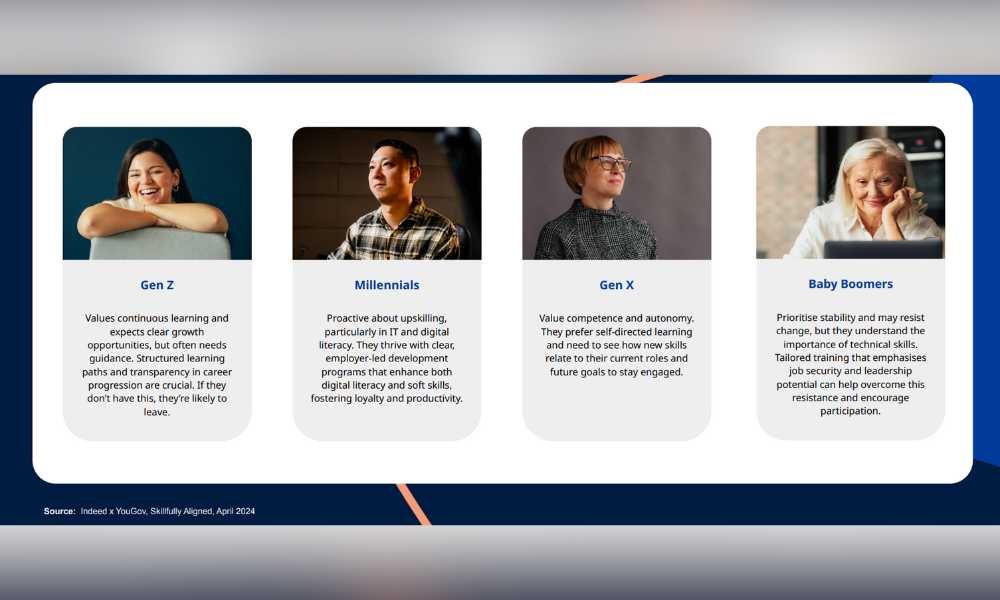
The Australian skills gap is expected to become more prevalent over the next five years

This feature was created in partnership with Indeed.
As the skills gap continues to plague Australian workplaces, organisations are resorting to ever more unique methods to both retain their existing talent and develop their leadership teams. According to Indeed’s report, Skillfully Aligned: Closing the gap for a future-proofed workforce, this skills gap is expected to become more prevalent over the next five years, with 36% of occupations in Australia already in national shortage. What’s more, one in three recruiters only expect these recruiting challenges to get harder.
In a recent roundtable hosted by HRD and Indeed, the issues of upskilling, skills-based hiring and developing soft skills in leadership were a focal point of discussion. And, for leaders looking to not only survive but thrive in the coming months, it’s a case of evolve with the market or risk losing out on key talent in 2025.
In that vein, HRD Australia posed the question of what are some real-time, tangible strategies that employers can implement now to plug those gaps in their teams?
“[At Indeed], we’d suggest investing in skills-based hiring, upskilling, and reskilling to bridge the growing skills gap,” says Rachael Townsley, marketing director at Indeed. “The gap is widening, and it’s crucial to adopt a skills-first mindset to uncover hidden talent and future-proof your organisation. By prioritising a culture of continuous learning, leaning in to skills-based hiring where it makes sense to do so, you can ensure your workforce remains competitive and ready for the challenges ahead.”
According to Indeed’s report, and the debate at the roundtable, skills-based hiring is very much a way of the future. Here in Australia, organisations are starting to challenge traditional qualification-based hiring and are exploring skills-based approaches. However, it’s still not very common as it’s seen as ‘difficult’.
For employers, it’s a challenge – but one which could reap a lot of rewards.
“Skills-based hiring has lots of potential benefits,” adds Townsley. “It opens up a broader talent pool, increases diversity, and can lead to better job-role alignment, which in turn boosts retention and agility. However, it’s not without its challenges. There’s a risk of misjudging skills or overlooking valuable experience, and it requires a significant, upfront investment in developing assessment tools and training hiring managers.”
All the roundtable participants agreed – saying that while skills-based hiring is a challenge to implement, it can be rewarding. For those employers currently leveraging skills-based hiring, they’re building this process internally and leveraging it for mobility in order to help employees grow.
However, as with any approach, Townsley tells HRD it’s essential to weigh these pros and cons to ensure this approach aligns with your organisation’s goals and resources. For those wanting to know where to start, she suggests following four key steps:
“Also, know that you don’t need to go it alone,” adds Townsley. “There are some great organisations that specialise in helping businesses understand the skills they need, both now and in the future, and mapping their skills-based hiring approach. Some that we talk to as part of our report are WithYouWithMe, GoFigr and TQ Solutions.”
But it’s not just a focus on employee development that’s taken centre stage in 2024, the spotlight has also been on leadership teams. In today’s climate, leaders need higher levels of ‘human skills’ – though it's often easier said than done. When it comes to leaders, employers should be looking for a mix of soft skills, technical abilities and – most importantly – good communication.
“Our data shows that whilst there is a lot of buzz around AI and tech skills, both individuals and employers prioritise communication, teamwork, and adaptability as critical skills for the future,” says Townsley. “However, we see Human + Tech skills as the blueprint for future success and employers should invest in both areas to ensure their teams are equipped to succeed in a rapidly evolving landscape.”
With more generations in the workforce than ever before, employers need to consider how to approach skill development with each as it’s not a one-size-fits-all. Different generations bring unique expectations, experiences, and preferences when it comes to learning and developing new skills.
According to Indeed’s research, attitudes towards skills and upskilling differ from generation to generation. Data found that 15% of Boomers believe that they do not need to adapt their technical skills. However, 96% of Millennials believe in the need to improve their skills, with 37% specifically recognising the need to adapt IT and digital literacy skills.

One of the most effective ways to plug the talent and skills gap is constant learning. According to research from Indeed, 73% of Australians expect a change in the job skills required over the next five years, with 91% expressing confidence in their abilities to adapt to new job requirements. But how can employers encourage their people to take charge of their own development – and how can Indeed help here too?
“This starts with the employer and their commitment to building a culture of continuous learning,” adds Townsley. “By cultivating a learning culture, employers create an optimum environment where individuals feel empowered to invest in themselves, knowing their efforts are valued and aligned with the company's future.
“A key to success is acknowledging that education requires a flexible approach. Offering a variety of learning options—whether through online courses, mentoring, hands-on experiences, or even peer-to-peer learning—ensures that employees can grow in ways that suit their individual needs and preferences.”
Indeed’s research found that the future of employment in Australia is a focus on skills-based hiring, upskilling and engaging. Because as technology continues to evolve, that skills gap is only set to become more and more prominent. As such, it’s essential that employers educate themselves on the most up to date and effective strategies to fly high in 2025 and beyond.
“We provide valuable research and insights into the Australian workforce, offering detailed reports and resources that equip employers to navigate the evolving landscape of work,” adds Townsley. “By collaborating with industry experts, we help organisations stay ahead of emerging trends, ensuring they’re well-prepared to address future workforce challenges and capitalise on new opportunities for growth and development.”
Download Indeed’s exclusive report here: Skillfully Aligned: Closing the gap for a future-proofed workforce and sign up to Lead with Indeed to be first to hear about Indeed’s upcoming research reports.